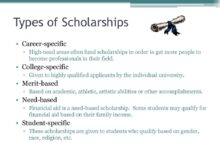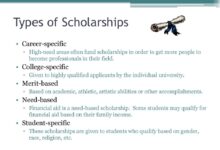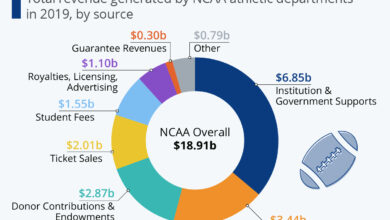Government Scholarships: What You Need To Know – Essential Information And Tips
Government Scholarships: What You Need to Know sets the stage for understanding the ins and outs of securing this valuable financial aid, offering insights and guidance for prospective applicants.
From eligibility criteria to application processes, this comprehensive guide covers everything you need to navigate the world of government scholarships.
Overview of Government Scholarships
Government scholarships have a long history of providing financial assistance to students pursuing higher education. These scholarships are typically funded and awarded by government entities at various levels, from local to national governments.
The main purpose of government scholarships is to support students who may not have the financial means to pay for their education. By offering scholarships, governments aim to promote access to education, encourage academic excellence, and invest in the future workforce of the country.
Types of Government Scholarships
- Merit-based Scholarships: These scholarships are awarded to students based on their academic achievements, such as high grades or standardized test scores.
- Need-based Scholarships: These scholarships are awarded to students who demonstrate financial need, typically determined by their family’s income level.
- Minority Scholarships: These scholarships are designed to support students from underrepresented minority groups, such as ethnic or racial minorities.
- Research Scholarships: These scholarships are for students pursuing research in specific fields, such as science, technology, engineering, and mathematics (STEM).
- International Scholarships: These scholarships are available for international students seeking to study in a particular country, often promoting cultural exchange and educational collaboration.
Eligibility Criteria
Government scholarships have specific eligibility criteria that applicants must meet in order to qualify for financial aid. These criteria often include factors such as citizenship status, income level, and academic standing. Let’s delve into the common requirements for government scholarships.
Citizenship Status and Residency
– Applicants are typically required to be citizens or legal residents of the country offering the scholarship.
– Some scholarships may have specific residency requirements, such as residing in a particular state or region.
Income Level
– Many government scholarships are need-based and prioritize applicants from low-income households.
– Applicants may need to demonstrate financial need through documents like tax returns or FAFSA forms.
Academic Performance
– Academic standing is a crucial factor in qualifying for government scholarships.
– High school students may need to maintain a minimum GPA, while college students may need to meet certain academic benchmarks.
– Standardized test scores, such as SAT or ACT scores, are often considered in the selection process.
Specific Criteria
– Some government scholarships may have specific criteria related to the field of study. For example, scholarships for STEM majors or education majors.
– Community service involvement and leadership experience may also be required for certain scholarships.
Application Process
When applying for government scholarships, it is essential to follow the typical steps to ensure a successful submission. One of the most crucial aspects is submitting all necessary documents to support your application. Here are some tips for preparing a strong scholarship application.
Submit all Necessary Documents
- Make sure to carefully read the application instructions and provide all required documents, such as transcripts, letters of recommendation, and personal statements.
- Double-check that all documents are complete, accurate, and submitted within the specified deadline to avoid any delays or disqualification.
- Organize your documents in a clear and easy-to-follow manner to make it easier for the scholarship committee to review your application.
Prepare a Strong Application
- Highlight your achievements, experiences, and goals that align with the scholarship criteria to demonstrate why you are a strong candidate.
- Customize your application to each scholarship opportunity by tailoring your personal statement and essays to showcase your unique qualities and aspirations.
- Proofread your application thoroughly to eliminate any errors in grammar, spelling, or formatting that could detract from your overall presentation.
Benefits of Government Scholarships
Government scholarships offer numerous advantages to recipients, making them a highly sought-after form of financial aid for students pursuing higher education. These scholarships not only provide financial support but also come with various benefits that can significantly impact a student’s academic and professional journey.
Financial Assistance
- Government scholarships cover tuition fees, textbooks, and other educational expenses, relieving students of financial burdens.
- Recipients may also receive stipends or allowances to help with living costs while pursuing their studies.
Merit-Based Opportunities
- Government scholarships are often awarded based on academic merit, encouraging students to excel in their studies and reach their full potential.
- These scholarships recognize and reward the hard work and dedication of students, motivating them to achieve academic excellence.
Professional Development
- Government scholarships provide opportunities for students to engage in research projects, internships, and other valuable experiences that enhance their skills and knowledge.
- Recipients gain access to networking opportunities, mentorship programs, and career guidance that can help shape their future career paths.
Global Exposure
- Some government scholarships offer the chance to study abroad, allowing students to gain international exposure, cross-cultural understanding, and valuable perspectives.
- Studying in different countries can broaden students’ horizons, expand their worldview, and foster a global mindset that is essential in today’s interconnected world.
Success Stories
“I wouldn’t have been able to pursue my dream of becoming a doctor without the government scholarship that supported my medical education. It not only lifted the financial burden but also inspired me to work hard and make the most of the opportunity.” – Sarah, Medical Student
“Thanks to the government scholarship I received, I had the chance to conduct groundbreaking research in my field of study and present my findings at international conferences. This experience opened doors for me and propelled my career forward.” – David, Research Scholar
Obligations and Responsibilities
Upon accepting a government scholarship, students are typically required to fulfill certain obligations and responsibilities to maintain their eligibility and funding. Failure to meet these requirements can have serious consequences, including the potential loss of scholarship funds, academic probation, or the need to repay the scholarship amount.
Maintaining GPA
- One common obligation is to maintain a certain Grade Point Average (GPA) throughout the scholarship period. This is usually outlined in the scholarship agreement and failing to meet the GPA requirement can result in academic consequences.
- It is important for students to prioritize their studies, set academic goals, and seek help when needed to ensure they meet the GPA criteria.
Participation in Community Service
- Some government scholarships may also require recipients to participate in community service projects or events. This helps students develop a sense of social responsibility and give back to the community.
- Students should actively engage in community service opportunities and fulfill the required hours to stay compliant with the scholarship terms.
Regular Check-ins with Advisors
- Another responsibility may involve regularly checking in with scholarship advisors or mentors to receive guidance and support. Advisors can offer valuable insights, resources, and assistance to help students succeed academically and personally.
- By maintaining open communication with advisors, students can address any challenges or concerns promptly, ensuring they stay on track with their scholarship requirements.
Impact on Education
Government scholarships play a crucial role in increasing access to education and fostering academic excellence. Let’s delve deeper into how these scholarships benefit recipients and society as a whole.
Contribution to Increasing Access to Education
- Government scholarships break down financial barriers that often prevent students from pursuing higher education.
- These scholarships enable students from underprivileged backgrounds to access quality education, thus promoting social mobility.
- By providing financial support, government scholarships encourage more students to enroll in educational programs, ultimately increasing the overall literacy rate in the country.
Role in Fostering Academic Excellence
- Government scholarships recognize and reward academic achievement, motivating students to strive for excellence in their studies.
- These scholarships create a competitive environment that pushes students to perform at their best and reach their full potential.
- By investing in talented individuals through scholarships, the government cultivates a pool of skilled professionals who can contribute to the country’s development.
Long-Term Impact on Recipients and Society
- Government scholarships empower recipients to pursue higher education and secure better career opportunities, leading to improved socio-economic outcomes.
- Scholarship recipients often become role models in their communities, inspiring other students to aim for academic success.
- Over time, the cumulative effect of government scholarships results in a more educated and skilled workforce, driving overall progress and innovation in society.
Effectiveness of Merit-Based vs. Need-Based Scholarships
- Merit-based scholarships reward academic achievement and talent, promoting educational equity by recognizing students based on their abilities.
- Need-based scholarships address financial disparities and ensure that students from disadvantaged backgrounds have equal access to education, thus promoting inclusivity.
- A balanced approach that combines merit-based and need-based scholarships can effectively support students from diverse backgrounds and create a more equitable education system.
Availability and Accessibility
Government scholarships are offered by various countries to local and international students, providing opportunities for higher education. The accessibility of these scholarships for students from different backgrounds is crucial in promoting inclusivity and diversity in education. Additionally, initiatives aimed at improving the availability of government scholarships play a significant role in ensuring equal access to educational opportunities.
Countries Offering Government Scholarships
- United States: The US government offers a wide range of scholarships to both domestic and international students, including the Fulbright Program and the Gilman Scholarship.
- United Kingdom: The UK government provides scholarships such as the Chevening Scholarships for outstanding individuals from around the world.
- Australia: The Australian government offers scholarships like the Australia Awards for students from developing countries.
Accessibility for Students from Different Backgrounds
- Merit-Based Scholarships: Many government scholarships are awarded based on academic excellence, making them accessible to students who demonstrate exceptional performance regardless of their socio-economic background.
- Need-Based Scholarships: Some governments offer scholarships specifically for students facing financial constraints, ensuring that those from disadvantaged backgrounds have access to higher education.
- Diversity Initiatives: Governments may implement programs to increase the representation of underrepresented groups in higher education by providing targeted scholarships and support.
Initiatives to Improve Availability
- Partnerships with Institutions: Governments collaborate with educational institutions to expand scholarship opportunities and reach a broader range of students.
- Information Campaigns: Efforts to raise awareness about available scholarships and the application process help students from diverse backgrounds access these opportunities.
- Skill Development Programs: Initiatives that focus on developing skills and competencies needed to qualify for government scholarships contribute to enhancing accessibility for all students.
Selection Process
The selection process for government scholarships involves several key steps to ensure that the most deserving candidates are chosen to receive financial assistance for their education. This process varies depending on whether it is a local or national government scholarship, but generally follows a similar structure.
Initial Screening
- Application Review: Scholarship committees typically begin by reviewing all submitted applications to ensure they meet the basic eligibility criteria.
- Document Verification: Applicants may be required to submit additional documents to verify information provided in their applications.
Interviews and Evaluation
- Interviews: Shortlisted candidates may be invited for interviews to further assess their suitability for the scholarship.
- Evaluation Criteria: Scholarship committees use a variety of criteria to evaluate applicants, including academic performance, extracurricular activities, personal statements, and letters of recommendation.
Final Decision
- Selection Committee: A selection committee reviews all applications and interview feedback to make final decisions on scholarship recipients.
- Notification: Successful applicants are notified of their selection, while unsuccessful candidates are informed of the decision.
Selection Criteria
- Academic Scholarships: Academic scholarships typically prioritize academic excellence, including GPA, standardized test scores, and class rank.
- Merit-based Scholarships: Merit-based scholarships consider a combination of academic achievement, leadership qualities, and community involvement.
- Need-based Scholarships: Need-based scholarships focus on financial need, as demonstrated by household income, assets, and other financial circumstances.
Local vs. National Scholarships
- Local Scholarships: Local government scholarships may have a more community-focused approach, considering factors like involvement in local organizations or volunteer work.
- National Scholarships: National government scholarships often have a broader scope and may place greater emphasis on academic excellence and potential impact at a national level.
Financial Support and Coverage
Government scholarships offer crucial financial support to students pursuing higher education. This support can come in various forms, including merit-based, need-based, and minority scholarships. These scholarships aim to alleviate the financial burden on students and enable them to focus on their academic pursuits.
Types of Scholarships
- Merit-Based Scholarships: Awarded to students based on their academic achievements, extracurricular activities, or other accomplishments.
- Need-Based Scholarships: Provided to students with demonstrated financial need to help cover educational expenses.
- Minority Scholarships: Aimed at supporting students from underrepresented or marginalized communities to access higher education.
Expenses Covered
Government scholarships typically cover a wide range of expenses, including tuition fees, accommodation, books, and living expenses. By providing this comprehensive support, scholarships ensure that students can fully focus on their studies without financial worries.
Funding Allocation and Disbursement
Government scholarships allocate funds based on specific criteria, such as academic performance, financial need, and eligibility requirements. The process for disbursement of funds is carefully managed to ensure that the financial support reaches the deserving recipients in a timely and efficient manner.
Impact on Academic and Professional Careers
Successful applicants who have benefited from government scholarships often experience a transformative impact on their academic and professional trajectories. By receiving financial support, these students can complete their education, pursue advanced degrees, and ultimately build successful careers in their chosen fields.
Monitoring and Evaluation
Monitoring and evaluation play a crucial role in ensuring the effectiveness and success of government scholarship programs. By tracking the progress of scholarship recipients and evaluating the impact of the scholarships, authorities can make informed decisions to improve the program and maximize its benefits.
Methods for Monitoring Progress
- Regular academic reports: Scholarship recipients are required to submit their academic progress reports periodically to ensure they are meeting the required standards.
- Progress meetings: Scheduled meetings with scholarship recipients can provide insights into their challenges, achievements, and overall progress.
- Performance evaluations: Conducting assessments or exams to gauge the academic performance and understanding of the recipients.
Evaluation of Impact
- Graduation rates: Tracking the number of scholarship recipients who successfully graduate from their programs can indicate the overall impact of the scholarships.
- Employment outcomes: Evaluating the employment status and opportunities of scholarship recipients post-graduation can demonstrate the effectiveness of the program in enhancing career prospects.
- Feedback surveys: Collecting feedback from scholarship recipients about their experiences and the impact of the scholarships on their lives can provide valuable insights for evaluation.
Successful Practices
- Long-term tracking: Establishing a system to monitor and track the progress of scholarship recipients even after graduation can provide valuable data on the long-term impact of the program.
- Collaboration with institutions: Working closely with educational institutions to gather data and feedback on scholarship recipients can enhance the evaluation process.
- Engagement with stakeholders: Involving various stakeholders, such as employers, alumni, and community members, in the evaluation process can offer diverse perspectives and insights.
Diversity and Inclusion
Government scholarship programs play a crucial role in promoting diversity and inclusion by providing opportunities to underrepresented groups and ensuring equitable access to education.
Efforts to Promote Inclusion
- Establishing specific criteria to ensure representation of diverse backgrounds in scholarship selection processes.
- Implementing outreach programs to attract applicants from marginalized communities.
- Partnering with organizations that focus on supporting underrepresented groups in education.
Impact of Diverse Recipients
- Diverse scholarship recipients contribute to a richer educational environment by bringing varied perspectives and experiences to the campus.
- Studies have shown that diverse student bodies can lead to improved academic performance and increased creativity.
- Inclusive scholarship programs help in breaking down barriers and fostering a more welcoming and supportive campus culture.
Regional Disparities in Inclusion Practices
- While some countries have made significant progress in promoting diversity and inclusion in scholarship programs, others still lag behind.
- Different regions may face unique challenges in ensuring equal access to educational opportunities for all groups.
- Comparing the implementation of inclusion practices across countries can provide valuable insights into effective strategies for promoting diversity in education.
Future Trends
Government scholarships are expected to undergo significant changes in the next decade as advancements in technology continue to shape the educational landscape. These changes will impact various aspects of scholarship programs, from application processes to candidate selection and fund allocation.
Adapting to Digitalization
Government scholarship programs may face challenges in adapting to a more digitalized application and selection process. As technology becomes increasingly integrated into education, programs will need to ensure that their systems are up-to-date and user-friendly. This shift towards digitalization may require additional resources and training for both staff and applicants to navigate the new processes effectively.
Targeted Outreach and Support
Opportunities exist for government scholarship programs to expand their reach to underrepresented communities through targeted outreach and support initiatives. By identifying and addressing barriers to access, programs can promote diversity and inclusion, ensuring that all qualified candidates have the opportunity to benefit from scholarships. Outreach efforts may include partnerships with community organizations, schools, and online platforms to reach a wider pool of potential applicants.
Emerging Trends in Administration
Emerging trends in the administration and distribution of scholarships include the use of AI algorithms for candidate selection and the implementation of blockchain technology for transparent fund allocation. These technologies have the potential to streamline processes, reduce bias, and increase efficiency in scholarship programs. By leveraging AI and blockchain, programs can enhance transparency, accountability, and fairness in the selection and distribution of funds.
Globalization Impact
Globalization presents both challenges and opportunities for government scholarship programs. As more students seek educational opportunities abroad, programs must adapt to accommodate international students and promote diversity. Strategies to make scholarships more inclusive and accessible to international students may include simplifying application processes, providing multilingual support, and offering targeted resources for international applicants. By embracing globalization, programs can enhance their reputation, attract top talent from around the world, and contribute to a more interconnected and diverse academic community.
International Exchange Programs
Government scholarships play a vital role in facilitating international exchange programs by providing financial support to students, researchers, and professionals seeking opportunities to study, work, or conduct research abroad.
Benefits of Participating in Exchange Programs
- Enhanced cultural awareness and global perspective.
- Acquisition of new skills and knowledge through exposure to different educational systems.
- Building international networks and collaborations for future endeavors.
- Promotion of mutual understanding and cooperation between countries.
Notable International Exchange Initiatives
Some of the notable international exchange initiatives funded by governments include:
| Fulbright Program: A flagship international exchange program funded by the U.S. government, promoting educational and cultural exchange between the United States and other countries. |
| Erasmus+: An EU-funded program supporting education, training, youth, and sport in Europe through various opportunities for international cooperation and mobility. |
| Chevening Scholarships: Funded by the UK government, offering scholarships to outstanding individuals with leadership potential to study in the UK. |
Community Engagement and Outreach
Government scholarships play a crucial role in fostering community engagement and outreach by empowering individuals to make a positive impact within their communities. Scholarship recipients are often involved in various community service projects that aim to address social issues, promote education, and enhance the overall well-being of the community.
Involvement in Community Service Projects
- Scholarship recipients are encouraged to participate in community service projects as part of their scholarship requirements.
- These projects range from volunteering at local schools and community centers to organizing awareness campaigns on important social issues.
- By actively engaging in these initiatives, scholarship recipients develop a sense of social responsibility and contribute to the betterment of their communities.
Examples of Community-Based Initiatives
- Government scholarship programs often support community-based initiatives such as tutoring programs for underprivileged students.
- Scholarship recipients may also be involved in environmental conservation projects, health awareness campaigns, and skill-building workshops for community members.
- These initiatives not only benefit the community at large but also provide valuable learning experiences for scholarship recipients, helping them develop leadership, teamwork, and communication skills.
Closure
In conclusion, Government Scholarships: What You Need to Know sheds light on the opportunities and challenges associated with pursuing these scholarships, empowering individuals to make informed decisions about their educational future.









